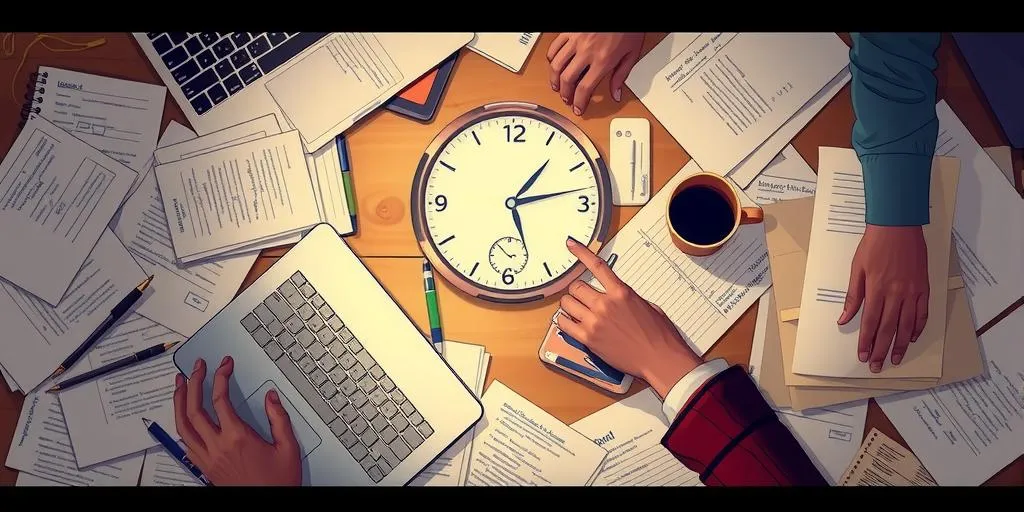Now Reading: What to Expect During Your First Meeting with a Lawyer in 2025
-
01
What to Expect During Your First Meeting with a Lawyer in 2025
What to Expect During Your First Meeting with a Lawyer in 2025

Meeting with a lawyer for the first time can feel overwhelming, especially if you’re not familiar with legal processes. In 2025, expect a shift in how these meetings are conducted due to technology and changing practices. Preparation is crucial; research your lawyer’s expertise and gather relevant documents to share during your meeting. Many consultations may occur virtually through video calls, so ensure you have a quiet space and stable internet connection. Expect honest discussions about fees, case evaluation, and establishing communication. This initial meeting is key to building trust and understanding the next steps of your legal journey together.
1. Preparation is Key for Your Meeting

Before you meet with your lawyer, preparation is essential to make the most of your time together. Start by researching your lawyer’s background and expertise. Look for reviews or testimonials from past clients to gauge their experience and success in handling cases similar to yours. This will help you feel more confident in your choice.
Gather any relevant documents that pertain to your case. This could include contracts, medical records, emails, or any other correspondence that could provide context to your situation. Having these documents on hand not only helps your lawyer understand your case better but also demonstrates your commitment to the process.
Consider writing down a list of questions or concerns you want to address during the meeting. This can include inquiries about your legal rights, potential outcomes, and the next steps in your case. By being prepared, you can ensure that the meeting is productive and that you leave with a clearer understanding of your legal standing.
2. The Digital Experience in Legal Consultations
In 2025, many initial meetings with lawyers will take place through virtual platforms, allowing for flexibility and convenience. Ensure you have a reliable internet connection and a quiet environment to discuss your legal matters without distractions. Lawyers will likely utilize secure methods to exchange documents digitally, which means you can send and receive important papers through encrypted portals. This not only streamlines the process but also enhances confidentiality. Expect to discuss your case in detail, and be ready to share any documents electronically, such as contracts or medical records, directly through these secure channels. The emphasis on digital experiences reflects a broader trend towards accessibility in legal services, making consultations easier for clients.
3. Understanding Fees and Costs Upfront
During your first meeting, it’s crucial to have a clear understanding of the lawyer’s fees and costs. Most lawyers will provide a transparent breakdown of their fee structures right away. You might encounter various options, including hourly rates, flat fees for specific services, or contingency fees where the lawyer only gets paid if you win your case. For instance, if you’re pursuing a personal injury claim, a contingency fee might be the most suitable option, as it aligns the lawyer’s incentives with your success. Additionally, don’t hesitate to ask about payment plans. Many firms now offer flexible financing options to make legal services more accessible. This upfront conversation will help you budget for your legal expenses and avoid any surprises later on.
| Fee Structure | Description | Examples |
|---|---|---|
| Hourly Rates | Fees charged based on the time spent on a case | $200 per hour |
| Flat Fees | Set amount for specific legal services | $1,500 for a simple divorce |
| Contingency Fees | Fees paid only if the case is won | 30% of the settlement |
| Payment Plans | Flexible payment options offered by lawyers | Monthly payments of $300 |
4. Focus of the Initial Consultation

The focus of your initial consultation with a lawyer is crucial for laying the groundwork for your case. First and foremost, expect a thorough case evaluation. This means you’ll be asked to discuss the details of your situation, including any relevant facts, timelines, and parties involved. For example, if you are dealing with a personal injury case, be prepared to share how the injury occurred, your medical treatments, and any impacts on your daily life. Your lawyer will listen carefully to understand the nuances of your case.
Additionally, your lawyer will likely outline potential legal strategies during this meeting. They will discuss what steps may be necessary going forward and provide insight into how your case might unfold. For instance, if your case involves a dispute, they may explain the options for negotiation or litigation, helping you to understand the possible paths ahead. This discussion is not just about what is happening now, but also about setting expectations for future developments.
5. Building a Strong Lawyer-Client Relationship
Establishing trust with your lawyer is essential for a successful partnership. Being open and honest about your case will help your lawyer understand your needs and represent you effectively. For instance, if there are any sensitive issues or previous legal troubles, sharing these upfront can prevent surprises later and allow your lawyer to strategize accordingly. It’s also important to set communication expectations during your first meeting. Discuss how often you’ll check in and the best methods (email, phone, or messaging apps) for updates. This clarity can help avoid misunderstandings and ensure you’re both on the same page throughout the legal process.
6. Role of Technology in Legal Services
In 2025, technology is significantly shaping how legal services are delivered. Lawyers are increasingly using artificial intelligence (AI) to conduct legal research, analyze case law, and draft documents. For example, AI tools can quickly sift through vast amounts of legal data to identify precedents that might be relevant to your case, saving time and improving the accuracy of legal advice. Additionally, many law firms have adopted client portals, which allow you to track the progress of your case in real-time, communicate with your attorney, and access important documents securely. This digital interaction not only enhances transparency but also makes it easier for clients to stay informed and engaged throughout the legal process.
7. Essential Questions to Ask Your Lawyer

When meeting with your lawyer for the first time, it’s important to ask questions that will help you understand their approach and how they can assist you. Start by asking about their experience with cases like yours. For instance, if you’re dealing with a personal injury case, inquire about how many similar cases they have handled and their success rate. This will give you confidence in their ability to represent you effectively.
Next, discuss the potential outcomes of your case. Ask them what you can realistically expect regarding timelines and results. For example, if you’re pursuing a divorce, ask about the factors that could influence the duration of the process and the possible scenarios for asset division. This helps in setting your expectations appropriately.
Don’t forget to ask about their communication style. Clarify how often you can expect updates and the best ways to reach them. This ensures you remain informed throughout the process and can address any concerns promptly.
Additionally, inquire about their strategy for your case. Understanding their approach can reassure you that they have a clear plan in place. Finally, ask about any potential challenges they foresee and how they plan to address them. This will help you feel prepared and more involved in your case.
- What is your experience with cases like mine?
- How do you charge for your services?
- What is your availability for communication?
- Can you provide references from past clients?
- What are the potential outcomes of my case?
- How long do you expect my case to take?
- What documents or information do you need from me?
8. Next Steps After Your Meeting
After your initial meeting, you should expect a follow-up email from your lawyer. This email will typically summarize the key points discussed and outline the next steps you need to take. It’s important to review this information carefully, as it may contain deadlines for submitting additional documentation or making decisions about your case.
Maintaining open communication is crucial. If you have any questions or need clarification on anything discussed during the meeting, reach out to your lawyer. For example, if you were unsure about the implications of a particular legal strategy, don’t hesitate to ask for more details. Establishing a habit of communication can help ensure that you and your lawyer are on the same page as your case progresses.
Additionally, start preparing for the next steps outlined by your lawyer. This may involve gathering more documents, considering the legal strategies discussed, or even preparing for a potential court appearance. Being proactive will help you feel more in control of your situation and contribute to a smoother legal process.
Frequently Asked Questions
1. What should I bring to my first meeting with a lawyer?
For your first meeting, bring any important documents related to your legal issue, like contracts, letters, or court papers. It’s also helpful to have a list of questions you’d like to ask.
2. How long will my first meeting with the lawyer last?
Typically, your first meeting with a lawyer can last anywhere from 30 minutes to an hour. It depends on the complexity of your case and how many questions you have.
3. What will the lawyer ask me during the meeting?
The lawyer will ask about the details of your situation, including key events, dates, and any people involved. They want to understand your case fully to help you.
4. Is it okay to ask the lawyer questions during our meeting?
Absolutely! In fact, it’s encouraged. Asking questions can help you understand the legal process better and find out how the lawyer can assist you.
5. What if I don’t understand something the lawyer says?
Don’t hesitate to ask for clarification. Lawyers are there to help, and they should be willing to explain things in a way that makes sense to you.
TL;DR Preparing for your first meeting with a lawyer in 2025 involves researching your lawyer, gathering relevant documents, and understanding fees upfront. Many initial consultations will be virtual, utilizing digital documentation and advanced technology. Expect to discuss your case in detail, focusing on evaluation and legal strategy while building a trusting relationship. Prepare essential questions to ask, and follow up with your lawyer after the meeting to stay informed about next steps.












